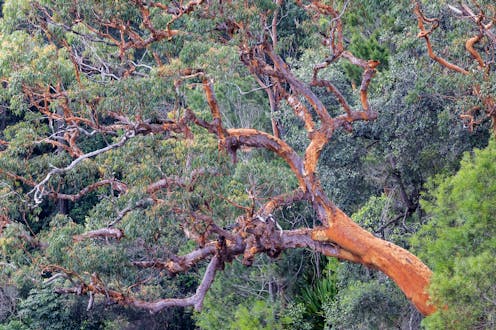The illegal killing of 265 trees on Sydney's North Shore is not just vandalism. It's theft on a grand scale
- Written by Gregory Moore, Senior Research Associate, School of Ecosystem and Forest Sciences, The University of Melbourne

In most illegal tree removals, you might see perhaps a handful of trees removed or poisoned. That’s why the recent felling and poisoning of 265 old trees[1] in Sydney’s Castle Cove has been so breathtaking and appalling.
This act – perpetrated by persons unknown – was not vandalism but theft of valuable community assets.
Future generations have been robbed of the benefits these trees – some of which were more than 80 years old – provided to our environment, the climate and as habitat for other plants and animals. It was theft on a grand scale.
Read more: Dodgy tree loppers are scamming elderly homeowners and hacking up healthy trees. Here's what you need to know[2]
Tree loss will cost us as the climate changes
In contrast to Indigenous people, most Australians have undervalued large old trees for nearly two centuries. But many of the ecological and environmental benefits these trees provide increase as they age over decades and perhaps centuries. These benefits are crucial to urban liveability and sustainability.
A global movement[3] is gaining momentum in urban forestry to preserve old trees for as long as we can to maximise the benefits they provide.
It is not about preservation at all cost, but a recognition that in a proper cost/benefit analysis[4], large old trees outperform younger trees. Unnecessary removal of large old trees is unsustainable both environmentally and economically.
This does not mean we should not replace dangerous trees or those that are rapidly declining.
It does mean, however, there should be no removal of large old trees without significant and demonstrably sound reasons.
Too many large, old, urban trees are being removed unnecessarily because other management options are not considered.
Whether via theft or bureaucratic-sanctioned tree removals, the general loss of old trees will cost us and our society dearly as the climate changes.
Old trees do things that young trees simply cannot
One of the significant benefits that trees provide over other vegetation types is that their leaf area is often more than double their canopy cover. This creates a great cooling effect[5] via both shade and evapotranspiration (the movement of water into the atmosphere, some of which comes through leaves).
Large trees are unequalled in cooling the environment around them. Old trees simply do things on a scale that small young trees cannot.
This means a slow-growing old tree can take in and store more carbon than a quick-growing young seedling. Every gram of carbon stored in this way is carbon saved from going into the atmosphere as greenhouse gas emissions.
Both carbon stores and shade are crucial to mitigating future climate change.
All of this is lost when trees are illegally or unnecessarily removed. The impact is felt not just now but for decades into the future.
The loss of even a single tree comes at a huge price
The loss of so many trees[6] in Sydney’s Castle Cove represents theft of environmental benefits and services from at least two, if not more, future generations of Australians. The trees lost were largely native coastal species that had decades (and in some cases more than a century) of growth before them.
We have known for many decades trees are often associated with between 30 and 50 other species – birds, mammals, reptiles, insects, fungi, algae and others. The removal of a tree affects most, if not all, of these other species. Some of these plants and animals will die as a result.
The number of associated species increases as the tree ages, and we have probably been underestimating species lost with large old tree removals in urban and natural forests.
Oaks in the UK, for example, are associated with over 2,300 other species[7]. One can only wonder how many other species will be affected by the felling and poisoning of the trees at Castle Cove. The illegal loss of even a single tree comes at a huge price.
Simply planting new trees doesn’t fix the problem
We tend to undervalue the shade provided by trees when considering urban development, or even road works. But tree removals lead to more urban heat[8], which usually means higher electricity bills (as people crank up the air conditioner).
Large old trees are seen by some as an expendable nuisance. Some local council laws aim to protect trees of a certain size, but fines for illegal removals are small.
In some instances, a one-for-one tree replacement is offered. But to replace the carbon stored in one large, mature tree would require a vast number of seedlings, many of which fail to survive[9] the first few years.
And it can take many years before planted trees reach carbon neutrality. The production, planting and maintenance processes all use resources, energy and fossil fuels, which means it can take decades[10] before a tree is carbon positive.
This situation is unsustainable environmentally and ludicrous economically, but it seems to go largely unnoticed. We accrue all of the costs of these plantings and recoup precious little benefit.
It would be far more sensible and sustainable if we retained our large old trees, making every effort to maximise and prolong their life spans.
Read more: The humble spotted gum is a world class urban tree. Here's why[11]
References
- ^ poisoning of 265 old trees (www.abc.net.au)
- ^ Dodgy tree loppers are scamming elderly homeowners and hacking up healthy trees. Here's what you need to know (theconversation.com)
- ^ movement (www.soiladvocates.ca)
- ^ analysis (e360.yale.edu)
- ^ cooling effect (andrewsforest.oregonstate.edu)
- ^ so many trees (www.abc.net.au)
- ^ species (www.woodlandtrust.org.uk)
- ^ urban heat (theconversation.com)
- ^ fail to survive (www.bloomberg.com)
- ^ decades (joa.isa-arbor.com)
- ^ The humble spotted gum is a world class urban tree. Here's why (theconversation.com)

















